Crohn’s disease is a chronic inflammatory disorder of the gastrointestinal tract that can affect any part of the digestive system, from the mouth to the anus. However, it most commonly affects the end of the small intestine (ileum) and the beginning of the large intestine. It is an autoimmune and progressive disease, with no definitive cure, but with treatments that allow for control and significant improvement in quality of life.
Causes
The exact cause of Crohn’s disease is not yet fully understood, but it is believed to result from a combination of genetic, immunological, and environmental factors. For reasons still unclear, the immune system begins to attack the digestive tract itself, causing persistent inflammation.
There is also a genetic predisposition — people with a family history of Crohn’s disease are at higher risk of developing the condition. In addition, factors such as smoking, prolonged use of anti-inflammatory drugs, consumption of ultra-processed foods, and exposure to certain microorganisms may influence the onset or worsening of the disease.
Symptoms
Symptoms vary widely from person to person and may appear in mild or severe forms, with periods of remission and relapses. The most common signs include:
Persistent abdominal pain (usually cramping)
Chronic diarrhea (sometimes with blood or mucus)
Unintentional weight loss
Fatigue and weakness
Fever
Anemia
Loss of appetite
Delayed growth in children
In more severe cases, there may be the formation of fistulas (abnormal connections between the intestine and other organs), abscesses, intestinal obstructions, and the need for surgery.
Diagnosis
Diagnosis is clinical and based on a combination of tests, as there is no single definitive exam. The doctor will typically order:
Blood tests (to assess anemia, inflammation, and nutritional deficiencies)
Stool tests (to rule out infections)
Endoscopy and colonoscopy (to directly visualize intestinal lesions and collect biopsies)
Imaging tests, such as CT scan, MRI, or enterography
It is important to distinguish Crohn’s disease from other similar conditions, such as ulcerative colitis, which shares several characteristics.
Treatment
Treatment for Crohn’s disease depends on the severity, location of the lesions, and the individual’s response. The main goal is to control inflammation, relieve symptoms, prevent complications, and maintain remission.
Therapeutic approaches include:
Anti-inflammatory and immunosuppressive medications: such as corticosteroids, azathioprine, methotrexate, and mesalamine
Biologics: such as infliximab and adalimumab, which act directly on inflammation mediators. These are indicated for moderate to severe cases
Antibiotics: to control secondary intestinal infections
Surgery: necessary in about 50% of cases, usually to remove severely damaged parts of the intestine or to correct fistulas and obstructions
In addition to medication, it is essential to maintain a balanced diet, avoiding foods that worsen symptoms (such as fatty, spicy foods, dairy products, or foods rich in insoluble fiber during flare-ups). In some cases, nutritional support with supplements or special diets may be needed.
Prevention
There is no guaranteed way to prevent Crohn’s disease, especially given its genetic and autoimmune nature. However, some measures may reduce the risk of developing or worsening the disease:
Avoid smoking: tobacco use is one of the main risk factors and worsens the prognosis
Maintain a healthy diet: based on fresh and minimally processed foods
Avoid excessive use of nonsteroidal anti-inflammatory drugs (NSAIDs): such as ibuprofen and diclofenac, which can aggravate intestinal inflammation
Manage stress: emotional stress can trigger or worsen flare-ups
Curiosities
Crohn’s disease was first described in 1932 by gastroenterologist Burrill Crohn, along with his colleagues Ginzburg and Oppenheimer
The disease is more common in industrialized countries, especially in North America and Western Europe
It can affect any age group, but it usually begins between the ages of 15 and 35
Celebrities such as Shannen Doherty and Dwight D. Eisenhower have lived with the disease and helped raise awareness about it
Myths and Facts
“It’s just a bad stomach ache” — Myth!
Crohn’s disease is a serious inflammatory condition that can deeply impact health and requires ongoing treatment.
“The disease is caused by poor diet” — Myth!
While diet influences symptoms, it is not the cause of the disease. It is an autoimmune and genetic condition.
“People with Crohn’s can’t live a normal life” — Myth!
With medical follow-up, proper treatment, and lifestyle changes, it’s possible to control symptoms and live an active and productive life.
“It’s not possible to get pregnant with Crohn’s” — Myth!
Pregnancy is possible, and with multidisciplinary care, many women have successful pregnancies.
Conclusion
Crohn’s disease is a public health challenge that requires early diagnosis, individualized treatment, and quality information to combat prejudice and misinformation. Although it is a chronic condition, it is possible to live well with the disease, as long as proper medical care is followed and healthy lifestyle habits are adopted. Raising awareness on the topic is essential to ensure the support and care of those living with this condition.



